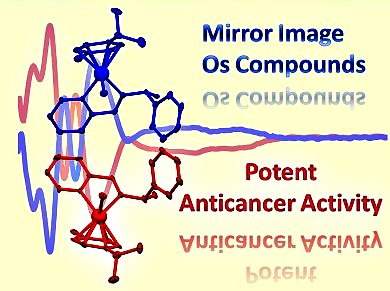Chirality can have a huge effect on how molecules interact with the body. Platinum complexes, such as cisplatin, are routinely used in the treatment of cancer. Additionally, most major pharmaceutical classes contain examples of metal compounds. Despite this, studies on how the chirality of metal complexes affects their biological activity are scarce, probably owing to the difficulty of isolating enantiomers or diastereomers of organometallic complexes.
Peter Sadler and colleagues, University of Warwick, UK, have isolated both diastereomers – ROs,RC and SOs,SC – of the two complexes [Os(η6–p-cymene)(ImpyMe)I]PF6 and its chlorido analogue [Os(η6–p-cymene)(ImpyMe)Cl]PF6 (ImpyMe: N-(2-pyridylmethylene)-(S/R)-1-phenylethylamine). The four complexes were tested for activity in human ovarian cancer cells. The two iodido complexes showed higher activity than the chlorido forms and approximately ten times higher activity than cisplatin. There was very little difference in activity between the ROs,RC and SOs,SC forms for both the iodido and chlorido complexes.
A National Cancer Institute 60-cell-line screening of the two iodido complexes, which generates a fingerprint-like pattern that can help identify the mechanism of new anticancer drugs, was performed. It highlighted similarities with the anti-microtubule drug, vinblastine sulfate. This drug inhibits tubulin polymerization. However, no direct effect on tubulin polymerization was found for the iodido complexes, which appears to indicate a novel mechanism of action.
- Mirror-Image Organometallic Osmium Arene Iminopyridine Halido Complexes Exhibit Similar Potent Anticancer Activity,
Ying Fu, Rina Soni, María J. Romero, Ana M. Pizarro, Luca Salassa, Guy J. Clarkson, Jessica M. Hearn, Abraha Habtemariam, Martin Wills, Peter J. Sadler,
Chem. Eur. J. 2013.
DOI: 10.1002/chem.201302183




